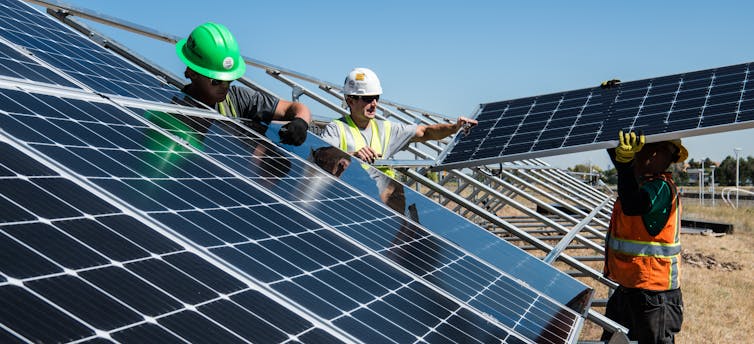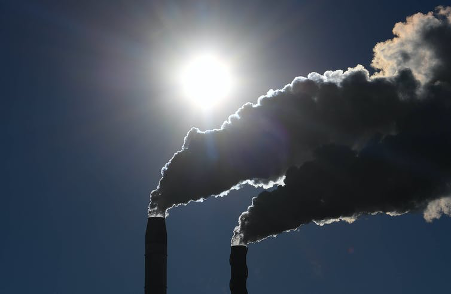Opinion
For the last few decades, the consensus among leading economists has been that putting a price on carbon is the most efficient way to reduce emissions. The idea behind it is simple. If we make activities that emit carbon – such as driving a car, consuming electricity or flying – more expensive, people will do these things less often.
Despite its apparent simplicity, the accomplishments of carbon taxes over the last decade have been underwhelming. According to the World Bank, 61 carbon pricing initiatives target 22% of the world’s carbon emissions. These have worked fairly well in some countries, such as the UK, where higher prices have prompted electricity utilities to dump coal since 2013, and Canada, where there is a nationwide tax on oil, coal and gas starting at US$15 (£12) per US ton of carbon dioxide emitted.
China, the world’s largest polluter, has struggled to set up an emissions trading system since 2017 that would put a price on a third of the country’s emissions, and allow the most polluting enterprises to buy carbon credits from greener companies. But experts fear the 2020 pandemic will delay these efforts even further.
In other countries, carbon taxes have sparked a significant backlash.
Why carbon taxes are unpopular
France’s gilets jaunes protests in 2018 and 2019 erupted after a domestic excise tax on energy products caused an increase in fuel prices. The unrest transformed into a broader movement against economic inequality in France.

Ricochet64/Shutterstock
In its 2019 report, the IMF calculated that the average carbon price stands at US$2 per ton of carbon dioxide. But the requisite price for reducing emissions in line with the Paris Agreement would mean a commitment of US$40–80.
One of the reasons ordinary people tend to resist carbon pricing is because it’s seen as unfair. This is particularly true when it’s applied as a direct tax on a commonly used commodity, such as fuel or electricity. This leads to an economy-wide price increase that burdens all of society indiscriminately. Since many people can’t afford to shoulder even a slight increase in their cost of living, the economic burden falls disproportionately on the poor and most vulnerable. These communities tend to have the lowest carbon footprints anyway, hence the impression that the poorest are punished unfairly through carbon pricing.
Policymakers have tried to address these problems by using the revenue raised from carbon taxes to subsidise green infrastructure, such as wind farms. Another plan is to offer tax rebates or direct benefits to poorer people, as lawmakers did in Canada. But these ideas have often been criticised for overestimating how fairly local institutions can redistribute wealth while underestimating the costs of implementing carbon taxes.
The case for a different approach
What if, instead of making fuel and other commodities and services more expensive, we used a financial incentive to make technologies that help reduce emissions – such as solar, wind and geothermal energy – more affordable?
Once each unit of carbon emissions has an appropriate economic value, this could be subtracted from the costs of carbon-reducing technologies. Prices linked to fossil fuels would remain constant while alternatives would get cheaper. The cost of driving a conventional car wouldn’t change, but buying and driving an electric vehicle would become cheaper. Household electricity tariffs would stay the same, but electricity from solar rooftop panels would drop in price.

Science in HD/Unsplash, CC BY The main advantage of this carbon reduction incentive, as I call it, is that instead of an economy-wide price increase, which would inevitably result in hardship for some, cleaner technologies would be supported according to their respective capacities to reduce and replace carbon emissions. The high upfront costs of cleaner technologies, such as electric vehicles, currently make them inaccessible to large sections of the population.
One way of funding this could be an income tax applied to the more affluent sections of the population. This taxed base could be slowly widened over time to increase revenue in the future. This would hold the biggest beneficiaries of carbon emissions accountable and help subsidise a just transition from fossil fuels among the people who can least afford to make the switch.
The approach may make more sense in countries where inequality is more pronounced, and the use of subsidised fossil fuels is more prevalent. Like any other climate policy, it must be part of a broader mix that reduces demand for carbon-intensive consumption while phasing in green alternatives.
Before any kind of carbon pricing can be effective, governments must change the way it is perceived among the public. A carbon reduction incentive could neutralise the current opposition while reducing carbon-intensive activities in a much more targeted and fair way.
Author: Sumedha Basu, PhD Candidate in Sustainability, University of Warwick
This article is republished from The Conversation under a Creative Commons license. Read the original article
Disclaimer: The articles expressed in this publication are those of the authors. They do not purport to reflect the opinions or views of Green Building Africa, our staff or our advertisers. The designations employed in this publication and the presentation of material therein do not imply the expression of any opinion whatsoever on the part Green Building Africa concerning the legal status of any country, area or territory or of its authorities.















